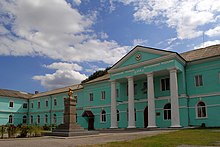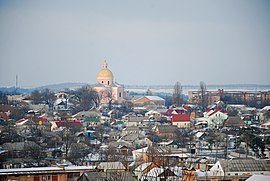Tulchyn
Tulchyn Тульчин | |
|---|---|
| |
| Coordinates: 48°40′28″N 28°50′59″E / 48.67444°N 28.84972°E | |
| Country | |
| Oblast | Vinnytsia Oblast |
| Raion | Tulchyn Raion |
| Hromada | Tulchyn urban hromada |
| Founded | 1607 |
| Area | |
• Total | 9.26 km2 (3.58 sq mi) |
| Elevation | 208 m (682 ft) |
| Population (2023) | |
• Total | 13,896 |
| • Density | 1,500/km2 (3,900/sq mi) |
| Postal code | 23600-23606 |
| Area code | +380 4335 |
Tulchyn (Ukrainian: Тульчин, IPA: [tʊlʲˈtʃɪn] ⓘ; Latin: Tulcinum; Polish: Tulczyn; Russian: Тульчин, romanized: Tulchin; Yiddish: טולטשין; Romanian: Tulcin) is a city in Vinnytsia Oblast (province) of western Ukraine, in the historical region of Podolia. It is the administrative center of Tulchyn Raion (district). Its population is 13,896 (2023 estimate)[1].
History
Tulchyn was first mentioned in written sources in 1607, under the name Nestervar.[2] It was a royal city in the Bracław Voivodeship in the Lesser Poland Province of the Crown of the Kingdom of Poland. In 1609 King Sigismund III Vasa granted the town to Walenty Aleksander Kalinowski. Until 1728 Tulchyn was part of the estates of the Polish magnates of the Kalinowski family (other distinguished members of Tulchyn family were Adam Kalinowski and Marcin Kalinowski), and then passed into the hands of Stanisław Potocki bypassing other Kalinowskis' branch, then in 1734 to Franciszek Salezy Potocki and his son Stanisław Szczęsny Potocki, who was the most memorable and infamous member of the Tulchyn branch of the Potocki family. During the Targowica confederation Tulchyn was the headquarters of the confederates. The 14th Polish Infantry Regiment was formed in Tulchyn in 1785 and garrisoned there.[3] In 1787, Tulchyn received Magdeburg rights.[2] The 6th National Cavalry Brigade and 12th Infantry Regiment were stationed there in 1789.[3]
In 1793, the Russian Empire annexed Tulchyn as part of the Second Partition of Poland. In the 1820s, Tulchyn was a centre of the movement plotting the Decembrist revolt against the Tsarist regime of Russia. A local branch of the Union of Prosperity was located in the city.[2]

Prior to the October Revolution, Tulchyn was home to a large Jewish population. There were two trade fairs, July 24 and October 1 each year, and separate 26 market days annually. In the Russian Civil War between 1917 and 1920 the town frequently changed hands, between the Poles, the Bolsheviks, White Russians and Ukrainians.[citation needed]
During World War II, Nazi Germany invaded and occupied all of Vinnytsia Oblast by the end of July 1941. A large section of the region, including Tulchyn, was handed over by the Nazis to Romania, who administrated it as Transnistria Governorate. After first being confined to a ghetto, Jews from Tulchyn were deported to the nearby Pechora concentration camp where they were killed.[4] The area was liberated by the Red Army in March 1944.[citation needed]
As of 2005, the city had a population of 16,136 people.[2]
In December 2022, as part of the derussification in Ukraine intensified by the full-scale Russian invasion of Ukraine that began that year, monuments to Alexander Pushkin and Alexander Suvorov were taken down in Tulchyn.[5]
Landmarks

An important landmark of the city is the palace of the Potocki family, built according to the principles of Palladian architecture according to the plans drafted by Joseph Lacroix during the 1780s.
Gallery
- Dominican Church in Tulchyn
- Catholic church
- Church of the Assumption
- City museum
Notable people

- Stanisław Trembecki (1739–1812), Polish poet
- Włodzimierz Potocki (1789–1812), Polish Count, artillery colonel
- Mieczysław Potocki (1799–1878), Polish magnate, owner of estates in Tulczyn, one of the richest Poles in the 19th century
- Alexander Veltman (1800–1870), the Russian writer, was stationed here for some years (and met Pushkin here)
- Józef Wysocki (1809–1873), Polish military commander, general of Polish Army, participant of Polish National Uprisings and the Hungarian Revolution of 1848
- Marian Dziewicki (1872–1935), Polish lawyer, President of Wilno, local government activist
- Bronisław Matyjewicz-Maciejewicz (1882–1911), Polish aviator
- Mykola Leontovych (1877–1921), the Ukrainian composer (who composed the Carol of the Bells), lived here
- Sophie Tucker, Ukrainian-born American singer, comedian, actress, and radio personality
External links
- Tulchin/Tulchyn (p. 424) at Miriam Weiner's Routes to Roots Foundation.
Further reading
- Weiner, Miriam; Ukrainian State Archives (in cooperation with); Moldovan State Archives (in cooperation with) (1999). "Chapter 11: Town Clips: Tulchin." Jewish Roots in Ukraine and Moldova: Pages from the Past and Archival Inventories . Secaucus, NJ: Miriam Weiner Routes to Roots Foundation. p. 424. ISBY 978-0-96-565081-6. OCLC 607423469.
References
- ^ "Sotsialnyy pasport Tulchynskoi" (PDF).
- ^ a b c d "Tulchyn". Internet Encyclopedia of Ukraine.
- ^ a b Gembarzewski, Bronisław (1925). Rodowody pułków polskich i oddziałów równorzędnych od r. 1717 do r. 1831 (in Polish). Warszawa: Towarzystwo Wiedzy Wojskowej. pp. 9, 30.
- ^ Vinokurova, Faina (1999). "The Holocaust in Vinnitsa Oblast" (PDF). In Weiner, Miriam (ed.). Jewish Roots in Ukraine and Moldova. Routes and Roots Foundation. pp. 332–34. ISBN 0965650812.
- ^ "У Тульчині демонтували пам'ятники Суворова й Пушкіна — Cуспільне Вінниця".













